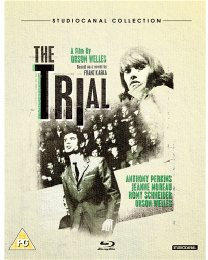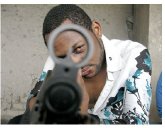Review for The Trial: 50th Anniversary
Only someone as ingenious as Orson Welles could over-shadow a work as brilliant as this with work even more so. OK – so ‘The Trial’ may not be ‘Citizen Kane’ or (my personal Welles favourite) ‘A Touch of Evil’ but by anyone else’s standards it’s an utterly brilliant piece of work. Oh – and don’t tell me that David Lynch hasn’t poured over this one because I just won’t believe you.
Based on Franz Kafka’s mesmerising novel of the same name, Welles does the near impossible by bringing it so effectively to life in just under two hours. It’s a stunning film in every regard. Perkins, riding high on the success of Psycho, is brilliantly cast as Josef K – the hapless ‘nobody’ who awakens one night to discover he is being arrested for a crime which he knows nothing about.
What follows is a nightmarish journey as he battles with pointless bureaucracy in a system so complex and archaic that it seems no one would ever be able to unravel it. The supporting cast of characters met during this journey are equally superb. Welles himself, as the bed bound advocate supposedly looking after K’s case, is grotesquely brilliant. Jeanne Moreau was an inspired choice too, as were Romy Schneider and Michel Lonsdale.
Welles made the film in 1962, in Europe, in an attempt to remove himself from the shackles of the US studio system – where again and again he had locked horns with those financing his pictures. But the film was under-funded and Welles had to shoot the film interiors in an abandoned railway station in Paris. Though this added huge strain on cast and crew, it could be argued the resulting surreal and archaic air shows that necessity had indeed become the mother of invention. Exteriors were shot in Yugoslavia bringing the faceless concrete jungle look and feel alive in a haunting way as a result.
Welles dearly wanted to shoot this in Kafka’s home town of Prague (and readers Kafka’s works like ‘The Castle’ who have visited the city will understand why) but Kafka’s works were still banned in the communist state at that time.
The movie is technically stunning. Any frame (and there would have been 30 every second) would make a perfect picture, with stunning monochrome cinematography. Odd angles, unusual views and weird sets all add to the surrealistic feast.
Welles has also managed to create a very cohesive version of Kafka’s novel in screenplay form, giving due time to all the essential ingredients that made the novel such a masterpiece.
Curiously, Welles personally dubbed many of the voices of Hungarian actors (and apocryphally some of Perkin’s lines too) for the English version of the film, and it’s very hard to hear the joins or recognise the timbre of his voice, such is the versatility of the man.
Once Welles had completed filming it took nearly a year to edit, with Welles involved in cutting and re-cutting sequences in varying order almost like a version of Burrough’s cut-up technique to get a result he was happy with. Finally he declared it his best film ever, even if not all critics agreed at the time, or since.
The Blu-Ray transfer is superb – virtually flawless – and audio crisp and precise. If this isn’t a good enough reason alone to replace your DVD version, then maybe the extras will swing it.
Welles, Kafka and The Trial (30m) is a French documentary with English subtitles, looks principally at the filming of The Trial and offers a good deal of interesting ‘back-story’
Welles, Architect of Light (22m) is principally an interview with Edmond Richard, Director of Photography. A master in his own right, no self-respecting cameraman will want to miss this.
Profile: Orson Welles (30m) A reasonable overview of the man and his work.
Interview with Steven Berkoff: adaptations of Kafka’s The Trial and Metamorphosis (15 m) Having adapted some of Kafka’s stories into plays, Berkoff focuses on his own interest in Kafka.
Deleted Scene: (6m) a scene that Welles cut at the last where Josef K meets a computer scientist who uses the computer to predict his fate. It adds a contemporary and surreal twist to the tale but was probably cut as it put the film firmly at odds with an otherwise fairly faithful rendition of the novel.
Trailer
Booklet (not seen by this reviewer) which includes an Essay on the film by Jonathan Rosenbaum, film critic and author of Discovering Orson Welles (2007).
You really owe it to yourself to see this and this Blu-Ray edition is the best yet. An utterly essential purchase.

































Your Opinions and Comments
Be the first to post a comment!